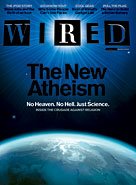Something’s afoot.
The pendulum swings.
Or kind of.
After the constant media focus on the supposed resurgence of Christianity and its stranglehold on US politics, the spotlight is now on the backlash. Atheists are stalking the bookshelves and hogging bestsellers’ lists with new books. It is not surprising that the media are picking up their strident views because, well, strident fundamentalists are occupying the world stage from Washington to Baghdad, and making extremely strident pronouncements. Which in their view have led to Crusades, the war in Middle East, militant Zionism, 9/11, the Northern Ireland "troubles," genocide in Darfur, etc.

The famous Darwinist Richard Dawkins is especially virulent in his views and it is no secret that he thinks religious adherents are bigots and nutcases, and are the cause of the world’s woes. I’ve not read his latest book ‘The God Delusion’ but it’s already a bestseller. I picked up this quote from the book that says; "Stalin was an atheist and Hitler probably wasn't, but even if he was ... the bottom line is very simple. Individual atheists may do evil things but they don't do evil things in the name of atheism."
Well, I’m tempted to say that Stalin and Hitler and their ilk may not have killed millions in the name of atheism, but they definitely did so in the name of natural selection. Why Dawkins should point the finger at religion and exonerate atheism, needs no rationale. But why not invoke what is obviously a demonstrable evidence of survival of the fittest when people kill each other (whatever the motivation)? So what’s wrong with indulging in a little gene pool cleansing?
Nevertheless Dawkins’ believes if all humanity would accept that there is no other existence beyond the one we occupy briefly on earth, it would make for a better life. In an interview in Salon, he said:
“Through no talent of our own, we have the privilege of knowing far more than past centuries. Aristotle would be blown away by what any schoolchild could tell him today. That's the kind of privileged century in which we live. That's what gives my life meaning. And the fact that my life is finite, and that it's the only life I've got, makes me all the more eager to get up each morning and set about the business of understanding more about the world into which I am so privileged to have been born.” [More]
In short: It is possible to derive meaning from meaninglessness. It’s really old-fashioned existentialism that's echoed in James Taylor’s poignant and plaintive Secret of Life:
But since we're on our way down,
We might as well enjoy the ride…
And since we're only here for a while,
We might as well show some style
 Wired magazine’s in on the act too. Its latest issue 14.11 carries an interesting write-up on 3 articulate intellectuals who constitute what the media are calling the New Atheists. The new band of intellectuals are Richard Dawkins, Sam Harris, and Daniel Dennett. Their mantra is simple: Religion is not just wrong, it’s plain evil. These intellectuals are not only out to debunk belief in God, but also respect for religious belief. But I suppose there are atheists and there are atheists. The article for instance examines Dennet’s wrestling to write an essay on human dignity for the President’s Council on Bioethics.
Wired magazine’s in on the act too. Its latest issue 14.11 carries an interesting write-up on 3 articulate intellectuals who constitute what the media are calling the New Atheists. The new band of intellectuals are Richard Dawkins, Sam Harris, and Daniel Dennett. Their mantra is simple: Religion is not just wrong, it’s plain evil. These intellectuals are not only out to debunk belief in God, but also respect for religious belief. But I suppose there are atheists and there are atheists. The article for instance examines Dennet’s wrestling to write an essay on human dignity for the President’s Council on Bioethics.
In grappling with these issues, Dennett knows that he can't rely on faith or scripture. He will not say that life begins when an embryo is ensouled by God. He will not say that hospitals must not invite the indigent to sell their bodies for medical experiments because humans are endowed by their creator with inalienable rights.
Ethical problems must be solved by reason, not arbitrary rules. And yet, on the other hand, Dennett knows that reason alone will fail.…though Dennett is an atheist, he does not see faith merely as a useless vestige of our primitive nature, something we can, with effort, intellectualize away. No rational creature, he says, would be able to do without unexamined, sacred things.
Reason alone does not satisfy and therefore we must make some space for the sacred, however unreasonable. Dennet might argue away God’s existence, but he won’t want to burst anyone’s bubble.
It surely is no coincidence that Andrew Sullivan is offering his take on truth and faith in TIME as well. The columnist suggests that fundamentalism is what makes religions dangerous. His latest article in TIME magazine says it contributes to Bush’s sense of divine appointment and disregard for external realities, and Ahmadinejad’s absolute belief in the return of the 12th Imam or Mahdi by accelerating Armageddon. While certainty brings calm, it more often than not perpetuates uncompromising dogmatism and breeds intolerance.
Sullivan’s solution is humility. If we would only admit that no one can know anything for sure, it would make us more tolerant. After all, isn’t it true that we believe because we do not know, says he? (Sullivan’s Catholic, but not the conservative mainstream type, and one who’s probably closer to Vatican II in spirit).
“If we cannot know for sure at all times how to govern our own lives, what right or business do we have telling others how to live theirs? From a humble faith comes toleration of other faiths. And from that toleration comes the oxygen that liberal democracy desperately needs to survive. That applies to all faiths, from Islam to Christianity. In global politics, it translates into a willingness to recognize empirical reality, even when it disturbs our ideology and interests. From moderate religion comes pragmatic politics. From a deep understanding of human fallibility comes the political tradition we used to call conservatism.”
Ethical positions should arise from pragmatism and not certainty, that’s Sullivan’s position.
 It seems to me there a huge mix-up in categories here. The writer goes on to say: “True belief is not about blind submission. It is about open-eyed acceptance, and acceptance requires persistent distance from the truth, and that distance is doubt.” Right. So what is one to accept? Would this thing we call ‘truth’ be worth living for and worth dying for? Or do we just embrace our inner doubts and get along? The point is, doubt may paradoxically be part of faith, but truth cannot be untruth at the same time however far the distance is. And speaking of doubt, does it follow that it's okay to express doubt in humility as a worthy virtue for our times? Hmm.
It seems to me there a huge mix-up in categories here. The writer goes on to say: “True belief is not about blind submission. It is about open-eyed acceptance, and acceptance requires persistent distance from the truth, and that distance is doubt.” Right. So what is one to accept? Would this thing we call ‘truth’ be worth living for and worth dying for? Or do we just embrace our inner doubts and get along? The point is, doubt may paradoxically be part of faith, but truth cannot be untruth at the same time however far the distance is. And speaking of doubt, does it follow that it's okay to express doubt in humility as a worthy virtue for our times? Hmm.
Interestingly, David Bowie 's 1997 album Earthling has a song 'Earthling on Fire' that features a sampled loop that goes, "I don't want knowledge, I want certainty." We all have questions and doubts, but we all desire certainty too.
I'm also reminded of the animated movie Polar Express. As the train conductor advised, ''It doesn't matter where the train is going. What matters is deciding to get on.'' It certainly matters if the train takes me to Auschwitz.
The media focus on God, faith, and truth provide necessary discourse on the meaning of life. I don’t subscribe to a Kantian leap in the dark but if what I believe makes sense, it must be able stand up to the closest scrutiny and inquiry.
 Started a neighbourhood filmclub recently. I know a ‘filmclub’ sounds rather pretentious but at least one can’t mistake its intent.
Started a neighbourhood filmclub recently. I know a ‘filmclub’ sounds rather pretentious but at least one can’t mistake its intent. Someone said that while we may have come from different places, we all watch the same movies. That says a lot about our times and how much movies shape our worldviews and inform our attitudes and behaviour. The plan is to eventually work out genres and themes so there is some kind of structure to our viewing. In the meantime, some movies we want to view together include:
Someone said that while we may have come from different places, we all watch the same movies. That says a lot about our times and how much movies shape our worldviews and inform our attitudes and behaviour. The plan is to eventually work out genres and themes so there is some kind of structure to our viewing. In the meantime, some movies we want to view together include:

